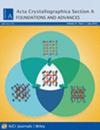旋转线群。
IF 1.8
4区 材料科学
Acta Crystallographica Section A
Pub Date : 2013-11-01
Epub Date: 2013-10-17
DOI:10.1107/S0108767313022642
引用次数: 0
摘要
自旋线群描述了准一维系统中自旋排列的对称性。这些群是由第一类线群导出的。其中,磁群是一个特例。首先讨论了单轨系统的自旋排列,然后将所得结论推广到多轨系统。以CuO2之字形链、(13)C纳米管和六铁体Ba2Mg2Fe12O22为例说明了上述结果。指出了在中子衍射和经典基态测定中的应用。本文章由计算机程序翻译,如有差异,请以英文原文为准。
Spin line groups.
Spin line groups describe the symmetries of spin arrangements in quasi-one-dimensional systems. These groups are derived for the first family of line groups. Among them, magnetic groups are singled out as a special case. Spin arrangements generated by the derived groups are first discussed for single-orbit systems and then the conclusions are extended to multi-orbit cases. The results are illustrated by the examples of a CuO2 zigzag chain, a (13)C nanotube and the hexaferrite Ba2Mg2Fe12O22. Applications to neutron diffraction and classical ground-state determination are indicated.
求助全文
通过发布文献求助,成功后即可免费获取论文全文。
去求助
来源期刊
自引率
11.10%
发文量
0
审稿时长
3 months
期刊介绍:
Acta Crystallographica Section A: Foundations and Advances publishes articles reporting advances in the theory and practice of all areas of crystallography in the broadest sense. As well as traditional crystallography, this includes nanocrystals, metacrystals, amorphous materials, quasicrystals, synchrotron and XFEL studies, coherent scattering, diffraction imaging, time-resolved studies and the structure of strain and defects in materials.
The journal has two parts, a rapid-publication Advances section and the traditional Foundations section. Articles for the Advances section are of particularly high value and impact. They receive expedited treatment and may be highlighted by an accompanying scientific commentary article and a press release. Further details are given in the November 2013 Editorial.
The central themes of the journal are, on the one hand, experimental and theoretical studies of the properties and arrangements of atoms, ions and molecules in condensed matter, periodic, quasiperiodic or amorphous, ideal or real, and, on the other, the theoretical and experimental aspects of the various methods to determine these properties and arrangements.

 求助内容:
求助内容: 应助结果提醒方式:
应助结果提醒方式:


